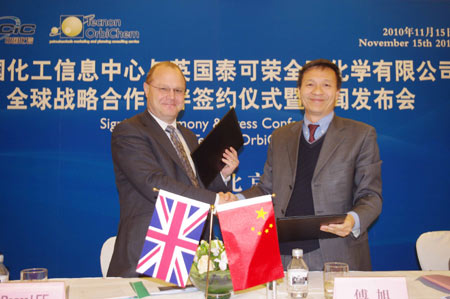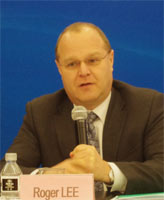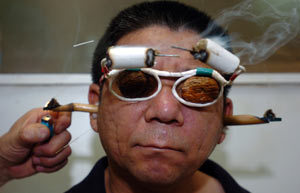Study on coal-to-olefins business launched
Updated: 2010-11-16 13:36
By Nie Peng (chinadaily.com.cn)
|
 |
|
Fu Xu, director of CNCIC, and Roger Lee, managing director of Tecnon OrbiChem, shake hands after signing a Memorandum of Understanding in Beijing to formalize the two firms' partnership, Nov 15. [Photo/ Provided to chinadaily.com.cn] |
China National Chemical Information Center (CNCIC) and London-based chemical consulting firm Tecnon OrbiChem said on Monday that they will partner on a new study of the methanol-to-olefins (MTO) business using coal as a feedstock.
The two consulting firms signed a Memorandum of Understanding in Beijing Monday afternoon to formalize their partnership that began several years ago.
Fu Xu, director of CNCIC, said the two institutions will work together to increase their global influence and sharpen their core competitiveness.
|
 |
|
Fu Xu, director of CNCIC [Photo/ Provided to chinadaily.com.cn] |
Beijing-based CNCIC is China's leading information provider for the chemical industry, while Tecnon OrbiChem is one of Europe's leading consulting firms specializing in the industries of bulk chemicals, petrochemicals and plastics.
The latest agreement came because CNCIC and Tecnon OrbiChem consider the time opportune to review the entire field of MTO and methanol-to-propylene initiatives in China.
"Something quite unique is happening in the chemical industry in China in the use of coal as a feedstock for chemicals," Roger Lee, managing director of Tecnon OrbiChem, said at a briefing on MTO following the signing ceremony.
CNCIC and Tecnon OrbiChem will look at which of and how soon the new ventures will become commercial realities, and what impact these initiatives will have on China's olefins industry, Lee said.
As world crude prices kept rising in recent years, the chemical industry, which uses petroleum as its basic feedstock, was seeking to reduce costs by looking at the possibility of using coal as a feedstock, Lee said.
Methanol can be purified easily by distillation and shipped with low costs, Lee added.
In recent months, three plants converting coal to olefins, mainly ethylene and propylene, have been completed in the country and are undergoing commercial start-up operations.
The first MTO plant was built by the Shenhua Group, the country's largest coal producer, in Baotou in North China's Inner Mongolia autonomous region.
The unit, using MTO technology developed by the Dalian Institute of Chemical Physics under the Chinese Academy of Sciences, started up all units in August and is designed to convert nearly 3.5 million tons of coal to 300,000 tons of polyethylene and 300,000 tons of polypropylene and higher olefins every year, Lee said.
|
 |
|
Roger Lee, managing director of Tecnon OrbiChem [Photo/ Provided to chinadaily.com.cn] |
Industry insiders said market analysis was essential before China adds any new MTO unit to avoid the excess capacity problem now facing the methanol industry.
However, both Fu and Lee shrugged off any potential overcapacity, saying the Chinese government has only approved three MTO units, which are also the only MTO plants in commercial operation in the world.
"In the chemical industry, overcapacity doesn't last for very long," Lee said. "The world consumes millions and millions of tons of polyolefins and polypropylene every year, so overcapacity today will become a shortage in only two or three years' time."
Lee said he foresees a bright future for China's MTP and MTO units. Other countries are likely to follow if China is successful, Lee added.
Paper's Digest

China bags Asiad team tennis title after 24 yrs
Wimbledon semifinalist Li Na led host China to capture the team tennis title on Tuesday at the Asian Games, accomplishing her Asiad tour with three consecutive victories.
China rate rises no panacea to curb inflation: PBOC adviser
Specials

Russian possessed with TCM
Born into a family of doctors, Maxime became interested in Traditional Chinese Medicine (TCM) at the age of 12, after hearing about TCM theories such as health preservation and recuperation.

Acupuncture takes stab at UNESCO list
Acupuncture and Peking Opera have been selected as candidates for UNESCO intangible cultural heritage status.

The wedding coach comes back to life
A groom carries his bride from a wedding coach in Xuchang, Henan province, Nov 11, 2010. Produced a local factory, various original hand-made wedding carriages were displayed on the streets, attracting young people chasing fashion and an environment-friendly lifestyle.





